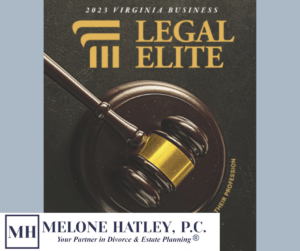Estate planning isn’t just something reserved for older or affluent adults. It’s critical protection for anyone who owns property, has minor children, or wants to protect their legacy. Whether you’re planning for the future or responding to life’s changes, a thoughtful estate plan can safeguard your assets and ease burdens for your loved ones.
At Melone Hatley, P.C., our experienced Reston estate and trusts attorneys guide individuals and families through every phase of the estate planning process. We are here to help you establish a solid plan that reflects your wishes and provides clarity and protection for those you care about most.
Why Estate Planning Matters
Estate planning is more than a financial exercise. It is a proactive way to protect yourself, your family, and everything you’ve worked so hard to build. Without a proper plan in place, the future of your estate could be left in the hands of the court instead of those you trust most. Furthermore, state law dictates who is legally entitled to inherit from your estate if you die without a will. This could potentially exclude important people in your life.
A thoughtfully prepared estate plan can:
- Protect your minor children by naming a guardian and ensuring they are financially cared for.
- Shield vulnerable loved ones with special needs or disabilities without risking their eligibility for benefits.
- Reduce tax burdens through the use of trusts and other tools designed to preserve wealth.
- Avoid probate costs and delays that can tie up your estate in court, sometimes for months or even years.
- Prevent family disputes by providing a clear and legally binding plan for how your property should be managed and distributed.
- Prepare for potential incapacity by appointing someone you trust to make decisions on your behalf if you are unable to.
By creating a clear, customized plan, you are taking control of your legacy and ensuring your wishes will be honored, even in challenging circumstances. Whether you are just beginning the process or need to update an outdated plan, working with an experienced Reston estate planning attorney can make all the difference in protecting what matters most.
The Purpose and Power of a Will
A will is usually considered the cornerstone of most estate plans. It is a powerful tool for directing what happens to your assets after you die, allowing you to make your wishes known clearly and legally.
In Virginia, a valid will allows you to:
- Direct how your property should be distributed, whether it’s the family home, investment accounts, personal belongings, or sentimental heirlooms.
- Choose your beneficiaries, including individuals who may not be related to you, such as close friends, stepchildren, or charitable organizations.
- Name someone you trust as an executor to carry out the instructions in your will and manage your estate responsibly.
- Appoint a guardian for your minor children or dependents with special needs, a critical decision that, if left unaddressed, would otherwise be decided by the court.
Without a will, your estate will be distributed according to state law instead of reflecting your true wishes. In addition, the court will appoint someone to manage your estate. That person may not be someone you would have chosen. In short, having a will minimizes uncertainty and preserves your wishes during a time of great loss. Regardless of the size or complexity of your estate, it is a foundational step in any estate plan.
Reston Trusts and Estates
Lawyer Near Me
What Happens if You Die Without a Will in Virginia?
When someone passes away without a valid will, they are said to have died “intestate” and the distribution of their estate is governed by state intestate succession laws.
In Virginia, if you die without a will
- If you are married with only children from that marriage, your spouse inherits the entire estate.
- If you are married but have children from a previous relationship, your spouse receives one-third of your estate, and your children from the other relationship receive the remaining two-thirds.
- If you are unmarried with children, your children inherit everything equally.
- If you are unmarried and have no children, your estate passes to your closest relatives, beginning with your parents, then siblings, nieces and nephews, and so on down the family line.
- If no living relatives can be located, your estate ultimately goes to the Commonwealth of Virginia.
This legal structure means that if you want to leave anything to an unmarried partner, stepchildren, close friends, or a charity, they will be excluded unless you have a legally valid will specifying your wishes. Furthermore, in the absence of a will, you also forfeit the ability to choose who manages your estate or who cares for your minor children.

Understanding Probate and Its Challenges
Probate is the legal process by which a will is validated, and an estate is settled. Even if you have a will, your estate must pass through probate unless steps have been taken to avoid it. During the process, the court oversees the payment of your debts, the resolution of any claims, and the eventual distribution of your assets.
While probate ensures legal oversight, it can also be time-consuming and costly. A strategic estate plan can reduce or eliminate the need for probate, helping your beneficiaries avoid the expense and frustration.
How Trusts Enhance a Well-Developed Estate Plan
While a will is important, it won’t address everything in an individual’s plan. Trusts offer additional, often more flexible, layers of control concerning your assets, planning for your future, and providing for your loved ones. In many cases, trusts allow you to achieve goals that a will alone cannot.
A trust is a legal device in which assets are held in the trust and managed for the benefit of beneficiaries by a trustee. Depending on the type of trust, they can take effect during your lifetime or upon your death and offer a variety of benefits depending on your objectives.
The advantages of incorporating trusts into your estate plan include:
- Avoiding probate
Assets placed in a trust are not subject to probate, which means they can be distributed more quickly and privately without court intervention. - Maintaining control
With a trust, you can specify exactly how and when your assets are distributed, even long after your death. This is especially helpful when beneficiaries are minor children, have special needs, or are not financially responsible. - Planning for incapacity
Certain types of trusts can appoint someone to manage your affairs if you become unable to do so, helping avoid the need for a court-ordered guardianship or conservatorship. - Reducing estate taxes and protecting assets
Irrevocable trusts may help shield assets from taxes and creditors, which is particularly valuable for high-net-worth individuals or families with complex financial holdings. - Support loved ones with special needs
A trust can ensure continued financial support for a beneficiary with disabilities without affecting their eligibility for essential government benefits. - Support charitable giving goals
Some trusts allow you to make significant donations to charitable organizations while also preserving financial benefits for your heirs.
The right type of trust depends on your personal goals, family circumstances, and the nature of your assets. Below are some of more commonly used trusts in Virginia estate plans, each offering unique benefits and applications.
- Revocable living trusts allow you to retain full control during your lifetime and make changes as needed. After your death, your successor trustee distributes the assets according to your wishes, avoiding probate.
- Irrevocable trusts typically can’t be changed once they are created. These offer strong asset protection and estate tax benefits.
- Special needs trusts are designed to provide supplemental support to a loved one with a disability without jeopardizing their access to government assistance.
- Charitable trusts provide a structured way to support a cause while offering potential tax benefits.
- Testamentary trusts are created through your will and activated upon your death. They are often used to manage inheritances for children or dependents.
Trust can be tailored to meet nearly any estate planning goal, from ensuring a smoother transfer of assets to protecting privacy and planning for future healthcare needs.
Other Estate Planning Tools Beyond Wills and Trusts
While wills and trusts are central to most estate plans, they are not the only tools available to protect your future. A comprehensive estate plan also includes other documents that address needs during your lifetime, particularly in the event of illness, injury, or incapacity. These legal instruments help ensure that your wishes are followed, and that your financial and healthcare decisions are handled by individuals you trust.
Powers of Attorney
A power of attorney is a legal device that authorizes another person, referred to as your agent or attorney-in-fact, to act on your behalf in financial, legal, or other matters. There are several types of powers of attorney:
- A general power of attorney allows your agent broad authority to act on your behalf. However, this authority ends should you become incapacitated.
- A limited or special power of attorney gives your agent authority to handle specific tasks or transactions.
- A springing power of attorney gives your agent authority only when a specific condition is met.
- A durable power of attorney grants your agent authority to act on your behalf if you become incapacitated, making this the most common choice for long-term planning.
Without a power of attorney in place, your loved ones may need to go to court to obtain authority to manage your affairs if you become incapacitated. A well-drafted power of attorney ensures someone you trust can step in to pay bills, manage investments, operate a business, or handle your legal matters, avoiding delays or confusion during times of crisis.
Advance Medical Directives
An advance medical directive is a written document that outlines your healthcare preferences in the event you become unable to communicate your wishes yourself. These directives provide critical guidance to both your medical professionals and your loved ones, helping ensure that your values and decisions are respected during times of serious illness or incapacity.
Advance directives typically include:
- The appointment of a healthcare agent, allowing you to designate someone you trust to make medical decisions on your behalf if you are unable to do so. This is often referred to as a healthcare power of attorney. You can also include specific instructions about the types of treatments you do or do not want, giving them clear guidance while also retaining control over your care.
- A living will expressing your preferences regarding life-sustaining treatments in situations where you are diagnosed with a terminal condition and you are unable to make decisions for yourself. For example, you can state whether you want doctors to use measures such as feeding tubes, ventilators, or resuscitation if recovery is unlikely. This can ease the burden on your loved ones by clearly stating your choices regarding end-of-life care.
Having these documents in place provides peace of mind for you and your family, knowing that your healthcare decisions will be honored and that no one will be left guessing during a medical crisis.
Plan Today for Peace of Mind Tomorrow
Estate planning is about more than passing on wealth. It’s about protecting the people you care about and making sure your wishes are honored during life’s most vulnerable moments. Taking proactive steps today can spare your loved ones confusion, conflict, and uncertainty in the future.
At Melone Hatley, P.C., our experienced Reston wills and trusts attorneys are here to guide you every step of the way. We provide compassionate, personalized legal support to help you make informed decisions that protect your legacy and your loved ones. No matter where you are in the planning process, we are here to help you build a plan that provides security and peace of mind. Call us at (703) 995 – 9900 or contact us through our website to schedule a free consultation with one of our Client Services Coordinators.


 (703) 995-9900
(703) 995-9900




























